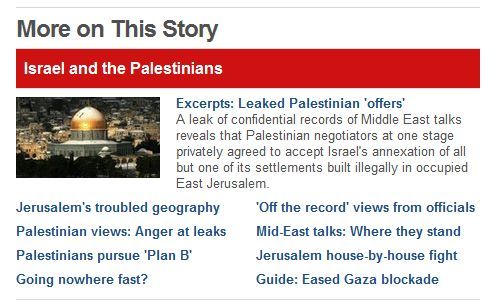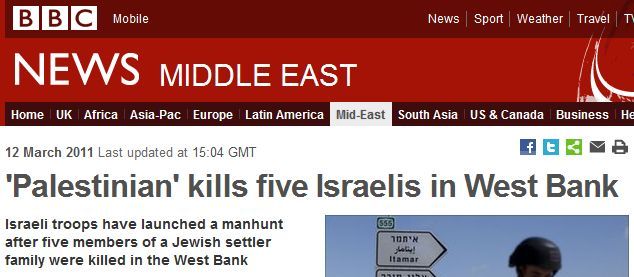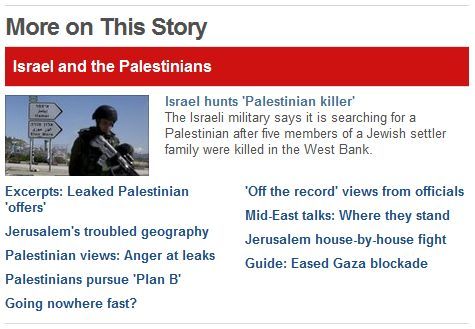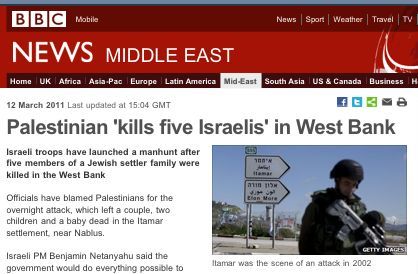HonestReporting’s criticism of the BBC’s coverage of the brutal terrorist murders of the Fogel family prompted a huge number of complaints to the BBC as well as attracting coverage in the Jerusalem Post.
Much of our critique was directed towards the BBC’s decision to promote an article concerning the Israeli decision to build new homes in settlements, an article that paid mere lip service to the shocking terrorist attack by a baby killer and demonstrated the BBC’s obsession with the settlement issue at the expense of all others.
Our criticism stands as does the charge that the BBC buried the story of the terrorist attack. While the BBC did cover the story immediately following the attack, the coverage disappeared from the BBC News homepage, the Middle East news page and nowhere in the story of the settlement building did any links to the existing BBC piece on the murders appear.
Below is the related story section from the BBC’s settlement article as it appeared on the morning of March 13.

The BBC usually links to related materials on later stories such as the settlement one critiqued above. Instead, the story of the terror attack disappeared from the main news pages, including that of the Middle East news where such items usually stay visible online for a period of at least a few days.
We issued an update to our original critique, also taking issue with the problematic nature of the BBC’s initial coverage of the terrorist attack – note the use of quotations in the headline below.
The BBC later removed the quotation marks, which had cast doubt on the veracity of the terror attack itself. Incredibly, however, those quotation marks reappeared around the word “Palestinian” so moving the doubt from the attack itself on to the identity of the attacker. Such is the BBC’s habitual need to eliminate all responsibility for Palestinian terror.

In addition, a photo of a soldier standing by a signpost pointing towards the settlement of Itamar still remains. Would it have pained the BBC that much to replace this with a photo of the slain family? Or is humanizing the Israeli victims of Palestinian terror too much for the BBC to contemplate?
Even when the BBC does cover the murders, the visual emphasis remains firmly fixed on the location of the event on a West Bank settlement and the portrayal of Israel in militaristic terms.
The BBC Response
This is the standard response sent by the BBC to many of your complaints:
Thank you for your e-mail. We initially covered the murders here on Saturday: http://www.bbc.co.uk/news/world-middle-east-12721170
On Sunday, the announcement about new settlers’ homes was made. Our West Bank correspondent offered analysis saying that it was “hard not to see the timing of the announcement as linked to the killings”. We felt it was appropriate therefore to recount the events at Itamar in this context, and the photograph on the page highlighted the importance of the killings.
However, this was not, as you suggest, our only coverage of the deaths, but the latest version of developments, a normal practice in 24-hour online journalism.
Indeed, whether to deflect criticism from its overall coverage or to avoid admitting burying the story of the murders in the first place, the BBC has quietly updated its settlement story page to include links to the initial story of the terrorist attack.

This may be the closest we will get to seeing the BBC acknowledge a serious error. Regarding the BBC’s overall coverage of the horrific terror attack, the BBC was not the only media outlet guilty of bias. By its actions and focus on the settlement issue at the expense of the murder of a three-month old infant, two small children and their parents, it demonstrated a level of callousness that was not seen elsewhere.
Don’t let the BBC and other major media players downplay the murders by dismissing them as “settlers”. Ensure that the media honors the humanity of the victims. Join the more than 1,400 people who shared the initial communique on Facebook.
The BBC’s response is utterly inadequate and deserves a redoubling of your efforts to hold this media monster to account. Keep sending those complaints to the BBC and demand that it addresses the issues that we have raised above. We cannot bring back the victims of terror but we can at least make every effort to see that the international media, including the BBC, treats them with the respect they deserve and not as anything less than the human beings they were.



